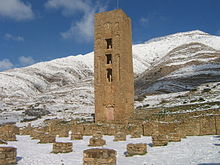Ali ibn Ishaq ibn Ghaniya
Ali ibn Ishaq ibn Ghaniya ( Arabic علي بن إسحاق بن غانية, DMG 'alī ibn isḥāq ibn ġānīya ; died 1188 ) was an emir in the Taifa of Mallorca for a short time between 1184 and 1185 . He then became a major warlord in North Africa .
ancestry
Ali ibn Ishaq ibn Ghaniya, often just Ali ibn Ishaq or Ali ibn Ghaniya , was the son of Ishaq ibn Muhammad ibn Ghaniya , who had assumed the rank of Emir in the Balearic Islands between 1155 and 1183 . Ali thus belonged to the dynasty of the Banu Ghaniya , an Almoravid Berber tribe belonging to the Sanhadscha .
Life
After the death of his father in 1183, the situation in the Taifa of Mallorca was unsettled. As Muhammad II, his brother Muhammad ibn Ishaq ibn Ghaniya , whom he was able to oust in 1184, became the new emir . In contrast to his brother, Ali represented aggressive action against the increasingly threatening Almohads . So he finally followed his noble advisers to relocate the war against the Almohads to North Africa. With 32 ships he transferred his armed force to the north coast of Algeria and landed at Bejaja , the former capital of the Hammadids . He was able to take Bejaja without difficulty on November 12, 1184, since the townspeople consisted of well-meaning Sanhajajabers and the Almohad garrison had just withdrawn. When the Almohads returned, they were put to flight.
A little later, Ali was able to secure the support of numerous Arab tribal chiefs , including the Banu Hilal (Hilalid), the Banu Riyah , the Athbadj (a subgroup of the Banu Hilal) and the Banu Judham . Ali then advanced west with his forces and occupied Algiers , Muzaya and Miliana . His brother Yahya ibn Ishaq ibn Ghaniya stayed behind and took over the business of government in Bejaja. Ali then returned to the east, where other tribes joined him. He then occupied the important Beni-Hammad fortress (Qalat) and besieged Constantine .
In the meantime, the Almohad caliph Yaqub al-Mansur had gathered a huge army, invaded northern Algeria, and recaptured Algiers, Miliana and other cities. Yahya was therefore forced to give up Bejaja again in 1185. He also broke off the siege of Constantine and withdrew towards the desert. He then marched across the Aurès Mountains to Djarid in southern Ifrīqiya (near Tozeur ) and moved into his new headquarters there. With the support of the local Arab tribes, he managed to conquer Tozeur and Gafsa . There he declared himself sovereign and had the Chutba read out in the name of the Abbassid caliph , who had recognized his rule and was also the only one who continued to promise him assistance.
From Gafsa he then moved to Tripoli , where he met the Armenian Qaraqush , with whom he entered into an alliance. Qaraqush was a freed slave of a nephew of the Ayyubid governor of Tripolitania Saladi and now commanded a contingent of Oghuz mercenaries . Together with Qaraqush and the Arab tribes of Banu Hilal and Banu Sulaym , the Almoravids crossed Ifrīqiya in 1186 and 1187 and wreaked havoc. In 1187, his brother Yahya returned to Mallorca and set out to recapture the islands. After bringing Mallorca under his control, he declared himself an emir. Ibiza and Formentera remained under the Almohad Abu-l-Abbas al-Siqilli . Menorca was ruled by Ibn Nayya for Yahya's brother Abd Allah ibn Ishaq ibn Ghaniya .
Ali and his allies then attacked the cities of Mahdia and Tunis , but they were unable to take them. A short time later an army under Yaqub al-Mansur arrived. This forced Ali to withdraw in the direction of Djarid, where he was pursued by 6,000 horsemen of the caliph. In the resulting battle in the plain of al-Umra , in which Ali's brother Muhammad ibn Ishaq ibn Ghaniya fell, Ali was able to achieve a significant victory over his persecutors on June 24, 1187. Yaqub al-Mansur now took command of his troops himself and was able to blow up Ali and his allies at El Hamma (near Gabès ) on October 14 of the same year . He also conquered Tozeur and Gafsa and had the city walls pulled down in both cities. Ali fled with Qaraqush to the desert of Fezzan .
When Yaqub al-Mansur withdrew after a while, Ali and Qaraqush returned to Ifrīqiya, gathered their supporters again and continued their looting.
Ali died in 1188. His successor was his brother Yahya ibn Ishaq, who continued the fight against the Almohads.
Individual evidence
- ↑ Enciclopèdia d'Eivissa i Formentera: Entry "Abu al-Abbas al-Siqilli"
| predecessor | Office | successor |
|---|---|---|
| Muhammad ii |
Emir of Mallorca 1184–1185 |
Muhammad ii |
| personal data | |
|---|---|
| SURNAME | Ali ibn Ishaq ibn Ghaniya |
| ALTERNATIVE NAMES | Ali ibn Ishaq; Ali ibn Ghaniya |
| BRIEF DESCRIPTION | Taifa of Mallorca |
| DATE OF BIRTH | before 1183 |
| DATE OF DEATH | 1188 |

